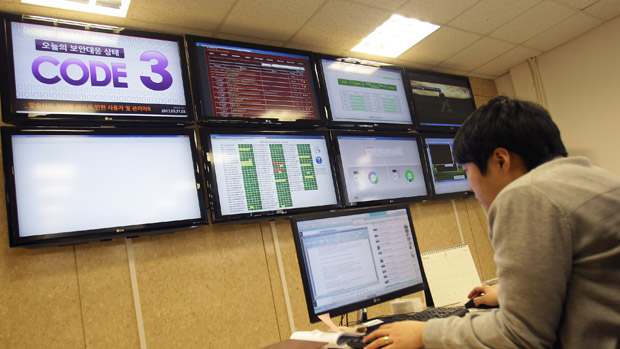North Korea back online: did US bring down the internet?
Experts sceptical over whether the US was behind North Korea's internet blackout

A free daily email with the biggest news stories of the day – and the best features from TheWeek.com
You are now subscribed
Your newsletter sign-up was successful
North Korea's internet was back up on Tuesday after a nine-hour disruption, Dyn Research, a company that monitors internet performance said.
The communist state appeared to come under sustained cyber attack soon after President Barack Obama warned that the US would "respond proportionally" to a massive hack at Sony Pictures, which led to the cancellation of Seth Rogan film The Interview, about North Korea. The FBI believes that Pyongyang was behind the attack.
Matthew Prince, president of CloudFlare, a performance and security company, told CNN that for nine hours "all the routes to get to North Korea just disappeared. It's as if North Korea got erased from the global map of the internet."
The Week
Escape your echo chamber. Get the facts behind the news, plus analysis from multiple perspectives.

Sign up for The Week's Free Newsletters
From our morning news briefing to a weekly Good News Newsletter, get the best of The Week delivered directly to your inbox.
From our morning news briefing to a weekly Good News Newsletter, get the best of The Week delivered directly to your inbox.
The blackout appears to be the worst that North Korea has ever experienced. The country has historically enjoyed a very stable connection, although only a small percentage of the population have internet access. Additionally, North Korea's internet structure is not sophisticated, making it a relatively easy target.
The timing of the disruption has raised suspicions that an external power – possibly either the US or South Korea – launched a "demonstration strike" against North Korea, The Times says. South Korea's nuclear power plant operator has recently been hacked and some have blamed North Korea for that.
The US government's cyber operations are highly classified, The Guardian says. Prior to the attack, state department spokeswoman Marie Harf said the US would not discuss "possible response options" in the wake of the Sony hack. But she added: "As we implement our responses, some will be seen, some may not be seen.”
North Korea insists that it had no involvement with the Sony Pictures hack, but has applauded the attack. And when asked if the country had been involved in the immediate aftermath of the attack a spokesman for the North Korean government replied: "Wait and see."
A free daily email with the biggest news stories of the day – and the best features from TheWeek.com
Not everyone is convinced that the US was directly involved in North Korea's internet blackout. Russell Brandom, writing for The Verge says that the timing of the attack "doesn't add up". North Korea has been experiencing denial of service attacks for a full week, Brandom notes, but the FBI didn't point the finger at Pyongyang over the Sony attack until Thursday.
If Obama had ordered a cyber attack on North Korea, notes Dan Holden of Atlas, it would have taken just seconds to commence, not days – and the outage would have been for much longer.
"I'm quite sure that this is not the work of the US government," Holden says. "Much like a real world strike from the US, you probably wouldn't know about it until it was too late. This is not the modus operandi of any government work."
Matthew Prince of CloudFare agreed, telling CNN: "It's highly unlikely it's the United States. More likely it's a 15-year-old in a Guy Fawkes mask."
The US declined to comment on the disruption.
-
 The ‘ravenous’ demand for Cornish minerals
The ‘ravenous’ demand for Cornish mineralsUnder the Radar Growing need for critical minerals to power tech has intensified ‘appetite’ for lithium, which could be a ‘huge boon’ for local economy
-
 Why are election experts taking Trump’s midterm threats seriously?
Why are election experts taking Trump’s midterm threats seriously?IN THE SPOTLIGHT As the president muses about polling place deployments and a centralized electoral system aimed at one-party control, lawmakers are taking this administration at its word
-
 ‘Restaurateurs have become millionaires’
‘Restaurateurs have become millionaires’Instant Opinion Opinion, comment and editorials of the day
-
 Epstein files topple law CEO, roil UK government
Epstein files topple law CEO, roil UK governmentSpeed Read Peter Mandelson, Britain’s former ambassador to the US, is caught up in the scandal
-
 Iran and US prepare to meet after skirmishes
Iran and US prepare to meet after skirmishesSpeed Read The incident comes amid heightened tensions in the Middle East
-
 Israel retrieves final hostage’s body from Gaza
Israel retrieves final hostage’s body from GazaSpeed Read The 24-year-old police officer was killed during the initial Hamas attack
-
 China’s Xi targets top general in growing purge
China’s Xi targets top general in growing purgeSpeed Read Zhang Youxia is being investigated over ‘grave violations’ of the law
-
 Panama and Canada are negotiating over a crucial copper mine
Panama and Canada are negotiating over a crucial copper mineIn the Spotlight Panama is set to make a final decision on the mine this summer
-
 Why Greenland’s natural resources are nearly impossible to mine
Why Greenland’s natural resources are nearly impossible to mineThe Explainer The country’s natural landscape makes the task extremely difficult
-
 Iran cuts internet as protests escalate
Iran cuts internet as protests escalateSpeed Reada Government buildings across the country have been set on fire
-
 US nabs ‘shadow’ tanker claimed by Russia
US nabs ‘shadow’ tanker claimed by RussiaSpeed Read The ship was one of two vessels seized by the US military